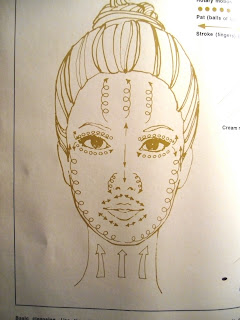ON FACEBOOK
ARTIST COLLECTIVE EXTRAVAGANZA
OFFICIAL WEBSITE
ACEMIAMI.COM
MY FACEBOOK
CHRISTIAN AMADO RODRIGUEZ
MY WEBSITE
CHRISTIANAMADO.COM
ARE YOU MY DOCTOR?
Tuesday, February 8, 2011
Thursday, January 20, 2011
:: ARE YOU MY BEAUTY? ::
THE DOCTORS PRESENT
"ARE YOU MY BEAUTY?"
When you have body dysmorphic disorder, you intensely obsess over your appearance and body image, often for many hours a day. You may seek out numerous cosmetic procedures to try to "fix" your perceived flaws, but never will be satisfied. Body dysmorphic disorder is also known as dysmorphophobia, the fear of having a deformity.
Treatment of body dysmorphic disorder may include medication and cognitive behavioral therapy
- Preoccupation with your physical appearance
- Strong belief that you have an abnormality or defect in your appearance that makes you ugly
- Frequent examination of yourself in the mirror or, conversely, avoidance of mirrors altogether
- Belief that others take special notice of your appearance in a negative way
- The need to seek reassurance about your appearance from others
- Frequent cosmetic procedures with little satisfaction
- Excessive grooming, such as hair plucking
- Extreme self-consciousness
- Refusal to appear in pictures
- Skin picking
- Comparison of your appearance with that of others
- Avoidance of social situations
- The need to wear excessive makeup or clothing to camouflage perceived flaws
- Nose
- Hair
- Skin
- Complexion
- Wrinkles
- Acne and blemishes
- Baldness
- Breast size
- Muscle size
- Genitalia
IF YOU ARE NOT MY DOCTOR
WHY ARE YOU TRYING TO FIX ME?
It's not known specifically what causes body dysmorphic disorder. Like many other mental illnesses, body dysmorphic disorder may result from a combination of causes:
- Brain chemical differences. Some evidence suggests that naturally occurring brain chemicals called neurotransmitters, which are linked to mood, may play a role in causing body dysmorphic disorder.
- Structural brain differences. In people who have body dysmorphic disorder, certain areas of the brain may not have developed properly.
- Genes. Some studies show that body dysmorphic disorder is more common in people whose biological family members also have the condition, indicating that there may be a gene or genes associated with this disorder.
- Environment. Your environment, life experiences and culture may contribute to body dysmorphic disorder, especially if they involve negative experiences about your body or self-image.
- Having biological relatives with body dysmorphic disorder
- Childhood teasing
- Low self-esteem
- Societal pressure or expectations of beauty
- Having another psychiatric disorder, such as anxiety or depression
Complications that body dysmorphic disorder may cause or be associated with include:
- Suicidal thoughts or behavior
- Repeated hospitalizations
- Depression and other mood disorders
- Anxiety disorders
- Obsessive-compulsive disorder
- Eating disorders
- Social phobia
- Substance abuse
- Low self-esteem
- Social isolation
- Difficulty attending work or school
- Lack of close relationships
- Unnecessary medical procedures, especially cosmetic surgery
- The need to stay housebound
Monday, January 10, 2011
:: The Eleven Rules of the Earth ::
1. Do not give opinions or advice unless you are asked.
2. Do not tell your troubles to others unless you are sure they want to hear them.
4. If a guest in your lair annoys you, treat him cruelly and without mercy.
5. Do not make sexual advances unless you are given the mating signal.
7. Acknowledge the power of magic if you have employed it successfully to obtain your desires. If you deny the power of magic after having called upon it with success, you will lose all you have obtained.
8. Do not complain about anything to which you need not subject yourself.
10. Do not kill non-human animals unless you are attacked or for your food.
11. When walking in open territory, bother no one. If someone bothers you, ask him to stop. If he does not stop, destroy him.
Thursday, January 6, 2011
:: DOCTORS NIGHT OUT ::
DR. SMITH & DR. INFERIORVENA NIGHT OUT PROMOTING "ARE YOU MY DOCTOR?" PROJECT 1.5.11
FUTURE VICTIM?
.............
Tuesday, December 28, 2010
Sunday, December 19, 2010
:: TRYPANOPHOBIA ::
Symptoms of Trypanophobia
If you have trypanophobia, you may dread receiving medical care, particularly injections. When you are required to undergo a medical procedure, you are likely to experience high blood pressure and an elevated heart rate in the hours and days leading up to your procedure. However, at the time of the event, your blood pressure may rapidly drop. You may even faint.Dangers of Trypanophobia
Unlike most phobias, which generally cause a fast pulse and feeling of panic, trypanophobia frequently causes blood pressure and heart rate to drop.Another danger of needle phobia is that it can cause sufferers to avoid visiting the DOCTOR or dentist. Although the actual phobia is of needles, it can lead to a more generalized fear of medical and dental healthcare providers. In extreme cases, the sufferer may refuse to receive even routine checkups.
Causes of Trypanophobia
Scientists are still unsure precisely what causes needle phobia. It seems to be inherited, as an estimated 80% of those who have the condition have a close relative that suffers from the same phobia. However, it is possible that the fear is learned rather than biologically inherited.
Some evolutionary psychologists believe that the fear may be rooted in an ancient survival technique. Puncture wounds could be deadly, particularly in the days before modern antibiotics. It is possible that a fear of puncturing the skin was an evolutionary adaptation.
Cognitive-behavioral therapy has been highly effective in treating trypanophobia. Through techniques such as systematic desensitization, the client can gradually learn to tolerate needles. Some experts have also found success using hypnotherapy.
In addition, new routes of medication distribution are being developed. For example, a nasal spray form of the flu vaccine called FluMist has been approved for use in most healthy people. Researchers are working on possible needle-free ways of testing diabetics’ blood sugar and performing other needed medical tests.
Trypanophobia is a serious condition that must be treated, as it could eventually lead you to miss out on needed medical care. If you think that you may suffer from this condition, you are urged to consult a mental health professional right away.
FEAR
Source:
Hamilton, James G. “Needle phobia: a neglected diagnosis.” Journal of Family Practice. August, 1995. June 28, 2008. http://findarticles.com/p/articles/mi_m0689/is_n2_v41/ai_17276569
Hamilton, James G. “Needle phobia: a neglected diagnosis.” Journal of Family Practice. August, 1995. June 28, 2008. http://findarticles.com/p/articles/mi_m0689/is_n2_v41/ai_17276569
Thursday, December 16, 2010
:: BLEEDING BLACK BLOOD ::
Q: For the past two months, a week before I started my period, I started bleeding a light brown color.When
my period did start, I was bleeding black blood . I've also been having real bad abdomal pain upper and
lower even when I'm not having my period. I've been taking Ortho Novum for a year and my period has
never been like this. Could you please tell me the reason or what I have done that would cause this to
happen?
A: Black blood sounds a little unusual. Please get to DOCTOR asap. I have not heard of this and have no
clue as to what may be happening, but am wishing you the best.
BLEEDING BLACK
Subscribe to:
Comments (Atom)




































